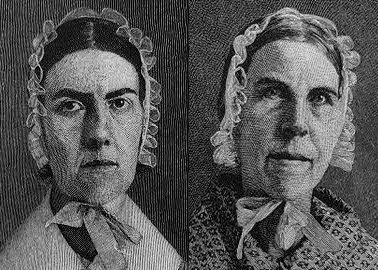
Angelina and Sarah Grimke.
City officials and local historians and residents gathered at the former Dana Avenue Bridge in Hyde Park this morning to officially rename it as the Grimke Sisters Bridge in honor of two 19th-century sisters who fought for both the abolition of slavery and for women's rights to vote - and who on March 7, 1870 led a march of women to Hyde Park Town Hall to vote in the town elections, the first time women voted in the US - although the town then discarded their ballots.
The sisters, children of a prominent South Carolina slave owner, fought for ideals "that were dangerously radical, even among reformers," such as that all people are equal and deserve the same rights as white men, Catherine Allgor, president of the Massachusetts Historical Society, said. At a time when "racism ran deep in the United States," even among white reformers, "they were attacked on all sides, they were denounced in pulpits all up and down the East Coast," she said.
She added that Sarah Grimke specified she was not asking for special treatment by men. "All I ask from our brethren is that they take our feet off our necks," words later made famous by then lawyer Ruth Bader Ginsburg.
Allgor said that in their later years, after the Civil War, when they moved to Fairmount Avenue in Hyde Park, they proved they meant their words when they took in three nephews, sons of their brother and a mixed-race woman and didn't just provide for them, but helped them through college through frequent "care packages." At a time when miscegenation was still a term people used regularly, "they loved their nephews," she said. "They lived their ideals to the letter."
Local philanthropist Barbara Lee - who wielded the obligatory oversized scissors with which to snip the ribbon formally "opening" the Grimke Sisters Bridge - noted that the sisters' move toward suffrage came as they realized, through their efforts for abolition, that women also were not truly free.
Along with other speakers, she praised the city for naming the bridge after the sisters so that girls - and boys - crossing over it might learn of the role women also played, a role they said has typically been ignored by the people who decide on which memorials to build and what names to put on things in Boston, she said. "We need to learn about history in order to make history," she said.
Outgoing City Councilor Tim McCarthy took credit for the bridge's new name. He said that when Mayor' Walsh's chief policy aide, Joyce Linehan, called him as the city was planning the $4-million renovation of the bridge over the Neponset River, and said they couldn't just keep it the Dana Avenue Bridge, he immediately said "How about the Grimke sisters?" Done.
In addition to remembering the historical role of two Hyde Park residents, the bridge work included new sidewalks and curb cuts that mean somebody in a wheelchair can now travel from Hyde Park Avenue all the way to Truman Parkway.
One of the two plaques installed on the bridge; the other declares it the Grimke Sisters Bridge:

Marty Walsh and Barbara Lee at today's dedication:

Like the job UHub is doing? Consider a contribution. Thanks!
Ad:
Comments
Mt. Hope Cemetery
By cw in boston
Sat, 11/16/2019 - 1:50pm
is the final resting place for Sarah Grimke, Angelina Grimke, and her husband Theodore Weld.
This recognition is well-deserved.
Yes. More of this
By anon
Sun, 11/17/2019 - 2:23pm
Please Boston.
I had never heard of the
By anon
Sun, 11/17/2019 - 7:17am
I had never heard of the Grimke sisters before reading your article about the bridge dedication. Thank you for posting this!
Thanks for this post, Adam
By anon
Mon, 11/18/2019 - 1:34am
Well deserved recognition for these pioneering women. Glad UH covered it.
vanity
By anon
Mon, 11/18/2019 - 10:44am
That sentence says it all. The city can't spend money to maintain basic infrastructure without giving city leaders an opportunity to rename stuff.
Sarah Grimke
By Snoofy
Mon, 11/18/2019 - 6:32pm
I wrote a paper about her in high school in ~1990 and was really taken with these sisters' story. Unfortunately my history teacher then spent the rest of the year smirking and asking me what "feminists" think about whatever he was saying. As a result it was the last history class I ever took. I hope he is still alive to see these women honored.
Add comment